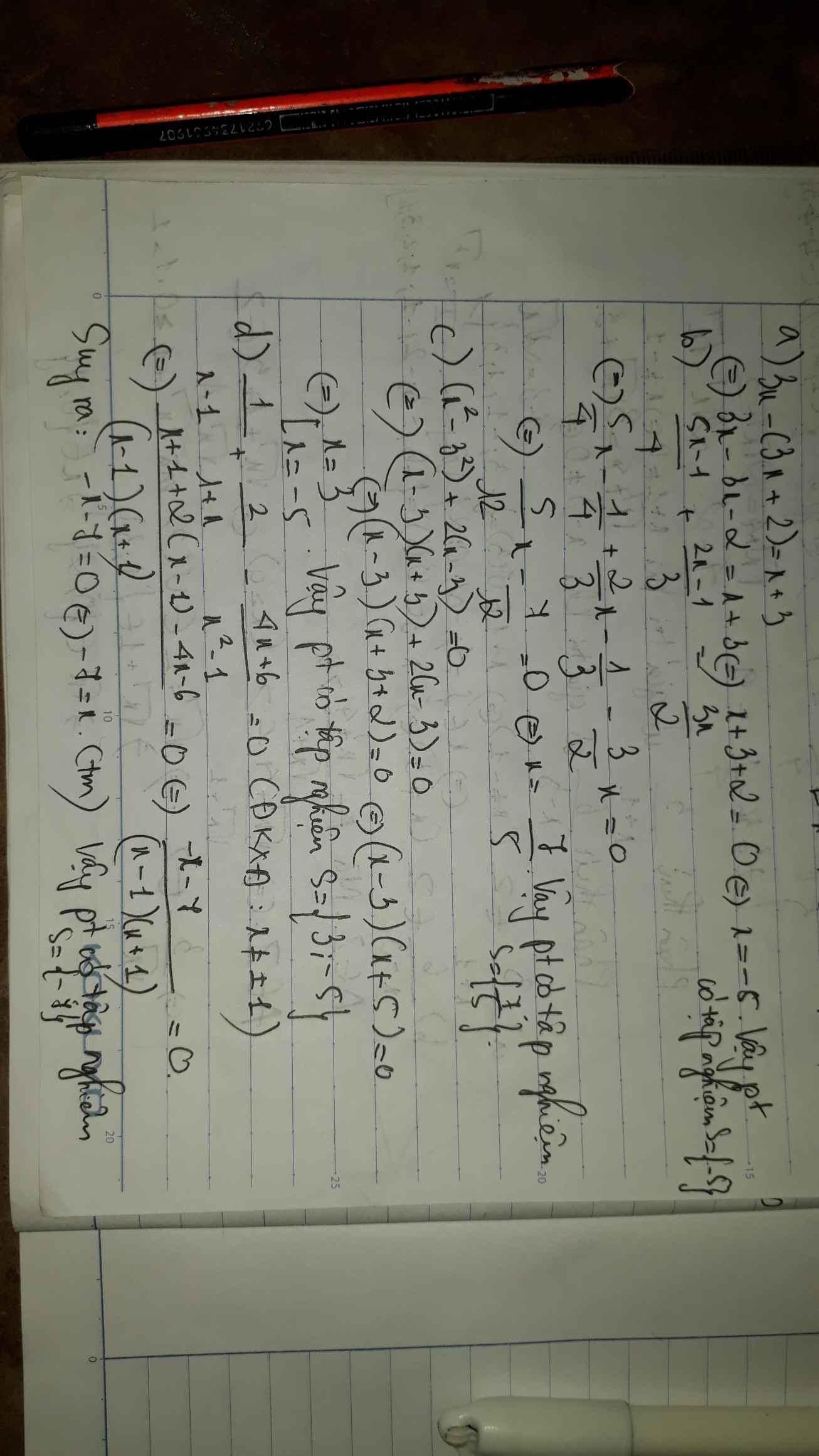\(\dfrac{1}{x^2-3x+2}+\dfrac{1}{x^2-5x+6}-\dfrac{2}{x^2-4x+3}\)

Những câu hỏi liên quan
\(\dfrac{2x}{x^2-1}+\dfrac{3}{x^2-3x+2}=\dfrac{4x}{x^2+3x+2}\)
\(\dfrac{3}{x^3-6x^2+11x-6}+\dfrac{2x}{x^2-5x+6}=\dfrac{1}{x^2-3x+2}\)
Giải phương trình
PT 2
\(\Leftrightarrow\dfrac{3}{\left(x-1\right)\left(x-2\right)\left(x-3\right)}+\dfrac{2x}{\left(x-2\right)\left(x-3\right)}-\dfrac{1}{\left(x-1\right)\left(x-2\right)}=0\) ( \(x\ne1;x\ne2;x\ne3\))
\(\Leftrightarrow\dfrac{3+2x^2-2x-x+3}{\left(x-1\right)\left(x-2\right)\left(x-3\right)}=0\)
\(\Rightarrow2x^2-3x+6=0\)
=> PT vô nghiệm.
Đúng 0
Bình luận (0)
Giải PT sau:a, 3x - 7 0b, 8 - 5x 0c, 3x - 2 5x + 8d, dfrac{3x-2}{3} dfrac{1-x}{2}e, ( 5x + 1)(x - 3) 0f, (x + 1)(2x - 3) 0g, 4x(x + 3) - 5(x + 3) 0h, 8(x - 6) - 2x(6 - x) 0i, dfrac{2}{x-1} + dfrac{1}{x} dfrac{2x+5}{x^2-x}k, dfrac{3}{x+2} - dfrac{2}{x-2} dfrac{2-x}{x^2-4}m, dfrac{3}{x} - dfrac{2}{x-3} dfrac{4-x}{x^2-3}n,dfrac{3}{2x+10}+ dfrac{2x}{x^2-25} dfrac{3}{x-5}u, dfrac{2}{x+3} - dfrac{3}{x-2} dfrac{x+4}{left(x+3right)left(x-2right)}
Đọc tiếp
Giải PT sau:
a, 3x - 7 = 0
b, 8 - 5x = 0
c, 3x - 2 = 5x + 8
d, \(\dfrac{3x-2}{3}\) = \(\dfrac{1-x}{2}\)
e, ( 5x + 1)(x - 3) = 0
f, (x + 1)(2x - 3) = 0
g, 4x(x + 3) - 5(x + 3) = 0
h, 8(x - 6) - 2x(6 - x) = 0
i, \(\dfrac{2}{x-1}\) + \(\dfrac{1}{x}\) = \(\dfrac{2x+5}{x^2-x}\)
k, \(\dfrac{3}{x+2}\) - \(\dfrac{2}{x-2}\) = \(\dfrac{2-x}{x^2-4}\)
m, \(\dfrac{3}{x}\) - \(\dfrac{2}{x-3}\) = \(\dfrac{4-x}{x^2-3}\)
n,\(\dfrac{3}{2x+10}\)+ \(\dfrac{2x}{x^2-25}\) = \(\dfrac{3}{x-5}\)
u, \(\dfrac{2}{x+3}\) - \(\dfrac{3}{x-2}\) = \(\dfrac{x+4}{\left(x+3\right)\left(x-2\right)}\)
a, 3x - 7 = 0
<=> 3x = 7
<=> x = 7/3
b, 8 - 5x = 0
<=> -5x = -8
<=> x = 8/5
c, 3x - 2 = 5x + 8
<=> -2x = 10
<=> x = -5
Đúng 1
Bình luận (0)
e) Ta có: \(\left(5x+1\right)\left(x-3\right)=0\)
\(\Leftrightarrow\left[{}\begin{matrix}5x+1=0\\x-3=0\end{matrix}\right.\Leftrightarrow\left[{}\begin{matrix}5x=-1\\x=3\end{matrix}\right.\Leftrightarrow\left[{}\begin{matrix}x=-\dfrac{1}{5}\\x=3\end{matrix}\right.\)
Vậy: \(S=\left\{-\dfrac{1}{5};3\right\}\)
Đúng 2
Bình luận (0)
`a ) 3x - 7 = 0`
`\(\Leftrightarrow \) 3x = 7`
`\(\Leftrightarrow \) x = 7/3`
Vậy `S = {-7/3}`
Đúng 0
Bình luận (0)
1/ \(\dfrac{x-4}{3}+2x=\dfrac{4x-2}{6}\)
2/ \(\dfrac{5x-2}{5}-2=\dfrac{1-2x}{3}\)
3/ \(\dfrac{x-2}{2}-\dfrac{2}{3}=x-1\)
4/ \(\dfrac{2x-1}{3}+\dfrac{3x-2}{4}=\dfrac{4x-3}{5}\)
5/ \(\dfrac{x-3}{9}-\dfrac{x+2}{6}=\dfrac{x+4}{18}-\dfrac{1}{2}\)
1: Ta có: \(\dfrac{x-4}{3}+2x=\dfrac{4x-2}{6}\)
\(\Leftrightarrow2x-8+12x=4x-2\)
\(\Leftrightarrow10x=6\)
hay \(x=\dfrac{3}{5}\)
2: Ta có: \(\dfrac{5x-2}{5}-2=\dfrac{1-2x}{3}\)
\(\Leftrightarrow15x-6-30=10-20x\)
\(\Leftrightarrow35x=46\)
hay \(x=\dfrac{46}{35}\)
3: Ta có: \(\dfrac{x-2}{2}-\dfrac{2}{3}=x-1\)
\(\Leftrightarrow3x-6-4=6x-6\)
\(\Leftrightarrow-3x=4\)
hay \(x=-\dfrac{4}{3}\)
Đúng 0
Bình luận (0)
1)\(\dfrac{x-4}{3}+2x=\dfrac{4x-2}{6}\)
\(\Leftrightarrow\dfrac{\left(x-4\right).2}{3.2}+\dfrac{2x.6}{6}=\dfrac{4x-2}{6}\)
\(\Rightarrow2x-8+12x=4x-2\\ \Leftrightarrow10x=6\\ \Leftrightarrow x=\dfrac{3}{5}\)
Đúng 0
Bình luận (0)
4: Ta có: \(\dfrac{2x-1}{3}+\dfrac{3x-2}{4}=\dfrac{4x-3}{5}\)
\(\Leftrightarrow40x-20+45x-30=48x-36\)
\(\Leftrightarrow37x=14\)
hay \(x=\dfrac{14}{37}\)
5: Ta có: \(\dfrac{x-3}{9}-\dfrac{x+2}{6}=\dfrac{x+4}{18}-\dfrac{1}{2}\)
\(\Leftrightarrow2x-6-3x-6=x+4-9\)
\(\Leftrightarrow-x-x=-5-12=-17\)
hay \(x=\dfrac{17}{2}\)
Đúng 0
Bình luận (0)
thực hiện phép tính
\(\dfrac{1}{3x-2}-\dfrac{1}{3x+2}-\dfrac{3x-6}{9x^2-4}\)
\(\dfrac{x+25}{2x^2-50}-\dfrac{x+5}{x^2-5x}-\dfrac{5-x}{2x^2+10x}\)
\(\dfrac{1-2x}{2x}-\dfrac{4x}{2x-1}-\dfrac{3}{2x-4x^2}\)
a) \(\dfrac{1}{3x-2}-\dfrac{1}{3x+2}-\dfrac{3x-6}{9x^2-4}\)
\(=\dfrac{3x+2-3x+2-3x+6}{\left(3x-2\right)\left(3x+2\right)}\)
\(=\dfrac{-3x+10}{\left(3x-2\right)\left(3x+2\right)}\)
b) \(\dfrac{x+25}{2x^2-50}-\dfrac{x+5}{x^2-5x}-\dfrac{5-x}{2x^2+10x}\)
\(=\dfrac{x+25}{2\left(x-5\right)\left(x+5\right)}-\dfrac{x+5}{x\left(x-5\right)}+\dfrac{x-5}{2x\left(x+5\right)}\)
\(=\dfrac{x^2+25x-2\left(x+5\right)^2+\left(x-5\right)^2}{2x\left(x-5\right)\left(x+5\right)}\)
\(=\dfrac{x^2+25x-2x^2-20x-50+x^2-10x+25}{2x\left(x-5\right)\left(x+5\right)}\)
\(=\dfrac{-5x-25}{2x\left(x-5\right)\left(x+5\right)}\)
\(=\dfrac{-5\left(x+5\right)}{2x\left(x-5\right)\left(x+5\right)}=\dfrac{-5}{2x\left(x-5\right)}\)
Đúng 0
Bình luận (0)
c) Ta có: \(\dfrac{1-2x}{2x}-\dfrac{4x}{2x-1}-\dfrac{3}{2x-4x^2}\)
\(=\dfrac{-\left(2x-1\right)^2-8x^2+3}{2x\left(2x-1\right)}\)
\(=\dfrac{-\left(4x^2-4x+1\right)-8x^2+3}{2x\left(2x-1\right)}\)
\(=\dfrac{-4x^2+4x-1-8x^2+3}{2x\left(2x-1\right)}\)
\(=\dfrac{-12x^2+4x+2}{2x\left(2x-1\right)}\)
Đúng 0
Bình luận (0)
1/ \(\dfrac{5x+1}{8}-\dfrac{x-2}{4}=\dfrac{1}{2}\)
2/ \(\dfrac{x+3}{4}+\dfrac{1-3x}{3}=\dfrac{-x+1}{18}\)
3/ \(\dfrac{x+2}{4}-\dfrac{5x}{6}=\dfrac{1-x}{3}\)
4/ \(\dfrac{x-3}{2}-\dfrac{x+1}{10}=\dfrac{x-2}{5}\)
5/ \(\dfrac{4x+1}{4}-\dfrac{9x-5}{12}+\dfrac{x-2}{3}=0\)
1: Ta có: \(\dfrac{5x+1}{8}-\dfrac{x-2}{4}=\dfrac{1}{2}\)
\(\Leftrightarrow5x+1-2\left(x-2\right)=4\)
\(\Leftrightarrow5x+1-2x+4=4\)
\(\Leftrightarrow3x=-1\)
hay \(x=-\dfrac{1}{3}\)
2: Ta có: \(\dfrac{x+3}{4}+\dfrac{1-3x}{3}=\dfrac{-x+1}{18}\)
\(\Leftrightarrow9x+27+12-36x=-2x+2\)
\(\Leftrightarrow-27x+2x=2-39\)
hay \(x=\dfrac{37}{25}\)
3: Ta có: \(\dfrac{x+2}{4}-\dfrac{5x}{6}=\dfrac{1-x}{3}\)
\(\Leftrightarrow3x+6-10x=4-4x\)
\(\Leftrightarrow-7x+4x=4-6=-2\)
hay \(x=\dfrac{2}{3}\)
Đúng 0
Bình luận (0)
4: Ta có: \(\dfrac{x-3}{2}-\dfrac{x+1}{10}=\dfrac{x-2}{5}\)
\(\Leftrightarrow5x-15-x-1=2x-4\)
\(\Leftrightarrow4x-2x=-4+16=12\)
hay x=6
5: Ta có: \(\dfrac{4x+1}{4}-\dfrac{9x-5}{12}+\dfrac{x-2}{3}=0\)
\(\Leftrightarrow12x+3-9x+5+4x-8=0\)
\(\Leftrightarrow7x=0\)
hay x=0
Đúng 0
Bình luận (0)
Đưa các phân thức sau về cùng mẫua) dfrac{x}{2x^2+7x-15}; dfrac{x+2}{x^2+3x-10}; dfrac{1}{x+5}b) dfrac{1}{-x^2+3x-2}; dfrac{1}{x^2+5x-6}; dfrac{1}{-x^2+4x-3}c)dfrac{3}{x^3-1}; dfrac{2x}{x^2+x+1}; dfrac{x}{x-1}d)dfrac{x}{x^2-2xy+y^2-x^2}; dfrac{y}{x^2+2yz-y^2-z^2}; dfrac{z}{x^2-2xz-y^2+z^2}
Đọc tiếp
Đưa các phân thức sau về cùng mẫu
a) \(\dfrac{x}{2x^2+7x-15}\); \(\dfrac{x+2}{x^2+3x-10}\); \(\dfrac{1}{x+5}\)
b) \(\dfrac{1}{-x^2+3x-2}\); \(\dfrac{1}{x^2+5x-6}\); \(\dfrac{1}{-x^2+4x-3}\)
c)\(\dfrac{3}{x^3-1}\); \(\dfrac{2x}{x^2+x+1}\); \(\dfrac{x}{x-1}\)
d)\(\dfrac{x}{x^2-2xy+y^2-x^2}\); \(\dfrac{y}{x^2+2yz-y^2-z^2}\); \(\dfrac{z}{x^2-2xz-y^2+z^2}\)
a: \(\dfrac{x}{2x^2+7x-15}=\dfrac{x}{\left(x+5\right)\left(2x-3\right)}=\dfrac{x^2-2x}{\left(x+5\right)\left(x-2\right)\left(2x-3\right)}\)
\(\dfrac{x+2}{x^2+3x-10}=\dfrac{x+2}{\left(x+5\right)\left(x-2\right)}=\dfrac{\left(x+2\right)\left(2x-3\right)}{\left(2x-3\right)\left(x+5\right)\left(x-2\right)}\)
\(\dfrac{1}{x+5}=\dfrac{\left(2x-3\right)\left(x-2\right)}{\left(2x-3\right)\left(x-2\right)\left(x+5\right)}\)
b: \(\dfrac{1}{-x^2+3x-2}=\dfrac{-1}{\left(x-1\right)\left(x-2\right)}=\dfrac{-\left(x+6\right)\left(x-3\right)}{\left(x-1\right)\left(x-2\right)\left(x+6\right)\left(x-3\right)}\)
\(\dfrac{1}{x^2+5x-6}=\dfrac{1}{\left(x+6\right)\left(x-1\right)}=\dfrac{\left(x-2\right)\left(x-3\right)}{\left(x+6\right)\left(x-1\right)\left(x-2\right)\left(x-3\right)}\)
\(\dfrac{1}{-x^2+4x-3}=\dfrac{-1}{\left(x-1\right)\left(x-3\right)}=\dfrac{-\left(x-2\right)\left(x+6\right)}{\left(x-1\right)\left(x-3\right)\left(x+6\right)\left(x-2\right)}\)
c: \(\dfrac{3}{x^3-1}=\dfrac{3}{\left(x-1\right)\left(x^2+x+1\right)}\)
\(\dfrac{2x}{x^2+x+1}=\dfrac{2x\left(x-1\right)}{\left(x-1\right)\left(x^2+x+1\right)}\)
\(\dfrac{x}{x-1}=\dfrac{x\left(x^2+x+1\right)}{\left(x-1\right)\left(x^2+x+1\right)}\)
Đúng 0
Bình luận (0)
giải các phương trình sau
a, 3x -(3x+2) =x+3
b, \(\dfrac{5x-1}{4}+\dfrac{2x-1}{3}=\dfrac{3x}{2}\)
c, \(\left(x^2-3^2\right)+2\left(x-3\right)=0\)
d,\(\dfrac{1}{x-1}+\dfrac{2}{1+x}-\dfrac{4x+6}{x^2-1}=0\)
a: Ta có: \(3x-\left(3x+2\right)=x+3\)
\(\Leftrightarrow x+3=-2\)
hay x=-5
b: Ta có: \(\dfrac{5x-1}{4}+\dfrac{2x-1}{3}=\dfrac{3x}{2}\)
\(\Leftrightarrow15x-3+8x-4=18x\)
\(\Leftrightarrow5x=7\)
hay \(x=\dfrac{7}{5}\)
Đúng 0
Bình luận (0)
thực hiện phép tính:a) dfrac{1}{2}x^3 . (x^2-6^x-10)b) -3x^2 . ( 5x^3-4x^2+3x-1)c) 3x . ( 5x^2 - 2x - 1)d) dfrac{1}{2}x^2y . ( 2x^3-dfrac{2}{5}xy^2-1)
Đọc tiếp
thực hiện phép tính:
a) \(\dfrac{1}{2}\)x\(^3\) . (x\(^2\)-6\(^x\)-10)
b) -3x\(^2\) . ( 5x\(^3\)-4x\(^2\)+3x-1)
c) 3x . ( 5x\(^2\) - 2x - 1)
d) \(\dfrac{1}{2}\)x\(^2\)y . ( 2x\(^3\)-\(\dfrac{2}{5}\)xy\(^2\)-1)
a: =1/2x^3*x^2-1/2x^3*6x-1/2x^3*10
=1/2x^5-3x^4-5x^3
b: =-3x^2*5x^3+3x^2*4x^2-3x^2*3x+3x^2*3x
=-15x^5+12x^4-9x^3+9x^2
c: \(=3x\cdot5x^2-3x\cdot2x-3x=15x^3-6x^2-3x\)
d: \(=\dfrac{1}{2}x^2y\cdot2x^3-\dfrac{1}{2}x^2y\cdot\dfrac{2}{5}xy^2-\dfrac{1}{2}x^2y=x^5y-\dfrac{1}{5}x^3y^3-\dfrac{1}{2}x^2y\)
Đúng 0
Bình luận (0)
Giải phương trình sau: \(\dfrac{1}{x^2-3x+2}+\dfrac{1}{x^2-5x+6}-\dfrac{2}{x^2-4x+3}\)
\(\dfrac{1}{x^2-3x+2}+\dfrac{1}{x^2-5x+6}-\dfrac{2}{x^2-4x+3}\) = 0 (ĐKXĐ: x \(\ne\) 1; x \(\ne\) 2; x \(\ne\) 3)
\(\Leftrightarrow\) \(\dfrac{1}{\left(x-1\right)\left(x-2\right)}+\dfrac{1}{\left(x-2\right)\left(x-3\right)}-\dfrac{2}{\left(x-1\right)\left(x-3\right)}\) = 0
\(\Leftrightarrow\) \(\dfrac{x-3+x-1-2\left(x-2\right)}{\left(x-1\right)\left(x-2\right)\left(x-3\right)}\) = 0
\(\Leftrightarrow\) \(\dfrac{0}{\left(x-1\right)\left(x-2\right)\left(x-3\right)}=0\) (luôn đúng)
Vậy pt trên có vô số nghiệm và x \(\ne\) 1; x \(\ne\) 2; x \(\ne\) 3
Chúc bn học tốt!
Đúng 3
Bình luận (0)
\(pt\text{ tương đương:}\dfrac{1}{\left(x-1\right)\left(x-2\right)}+\dfrac{1}{\left(x-2\right)\left(x-3\right)}-\dfrac{2}{\left(x-1\right)\left(x-3\right)}=0\text{ tương đương với: }\dfrac{1}{x-1}-\dfrac{1}{x-2}+\dfrac{1}{x-2}-\dfrac{1}{x-3}-\dfrac{2}{\left(x-1\right)\left(x-3\right)}=0\text{ hay:}\dfrac{1}{x-1}-\dfrac{1}{x-3}-\dfrac{1}{x-1}+\dfrac{1}{x-3}=0\text{ đúng}\)
Đúng 0
Bình luận (2)
Xem thêm câu trả lời

























